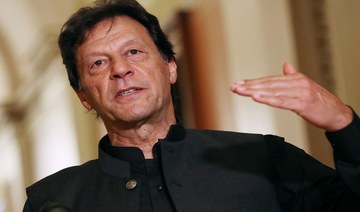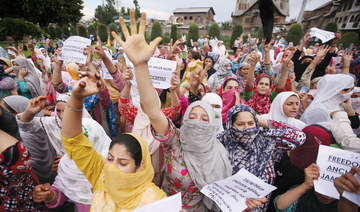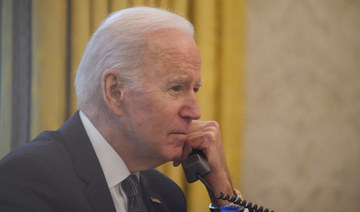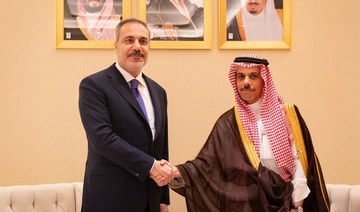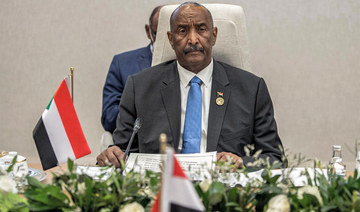SRINAGAR, India: India and Pakistan exchanged “heavy” cross-border fire on Saturday, after New Delhi’s move to strip the restive Kashmir region of its autonomy prompted a rare meeting of the UN Security Council.
The two foes regularly fire potshots over the Line of Control (LoC) in the disputed Himalayan territory, which is divided between the two countries and poisoned their relations since independence in 1947.
But the latest exchange follows India’s decision this month to rip up the special constitutional status of its part of Kashmir, sparking protests from the local population, outrage from Pakistan and unease from neighboring China.
“The exchange of fire is going on,” a senior Indian government official said, calling it “heavy.”
One Indian soldier was reportedly killed. Pakistan made no immediate comment on the violence.
Late Friday, Pakistan and China succeeded in getting the UN Security Council to discuss Kashmir — behind closed doors — for the first time since the Indo-Pakistan war of 1971.
Pakistani Prime Minister Imran Khan on Saturday hailed the gathering, saying that addressing the “suffering of the Kashmiri people & ensuring resolution of the dispute is the responsibility of this world body.”
New Delhi insists the status of the territory is a purely internal matter.
“We don’t need international busybodies to try to tell us how to run our lives. We are a billion-plus people,” India’s UN envoy Syed Akbaruddin said after the meeting.
US President Donald Trump urged the nuclear-armed rivals to come back to the negotiating table, speaking to Khan by phone on the importance of “reducing tensions through bilateral dialogue.”
India on Saturday meanwhile gradually restored phone lines following an almost two-week communications blackout in its part of Kashmir, imposed hours before Prime Minister Narendra Modi’s surprise August 5 gambit.
Seventeen out of around 100 telephone exchanges were restored Saturday in the restive Kashmir Valley, the local police chief said.
But mobiles and the Internet remained dead in the Muslim-majority Kashmir Valley, the main hotbed of resistance to Indian rule in Jammu and Kashmir state in a 30-year-old conflict that has killed tens of thousands.
Fearing an angry and potentially violent response, India also sent 10,000 extra troops to the area, severely restricted movement and arrested some 500 local politicians, activists, academics and others.
The state’s Chief Secretary BVR Subrahmanyam had said Friday there would be a “gradual” restoration of phone lines over the weekend, with schools to resume classes in some areas next week.
The transformation of Srinagar into an eerie maze of barricades, soldiers and concertinas of barbed wire has failed to stop public anger boiling to the surface.
“We want peace and nothing else, but they have kept us under this lockdown like sheep while taking decisions about us,” resident Tariq Madri said.
“Even my nine-year old son asked me why they had locked us inside,” he added.
Several hundred protesters clashed with police in the city on Friday, who responded with tear gas and pellet-firing shotguns.
People hurled stones and used shop hoardings and tin sheets as improvised shields, as police shot dozens of rounds into the crowd. No injuries were reported.
The clashes broke out after more than 3,000 people rallied in the city’s Soura neighborhood, which has witnessed regular demonstrations this month.
A week earlier around 8,000 people staged a protest which also ended in a violent confrontation with police, residents said.
“I want the government to know that this aggression and aggressive policies don’t work on the ground,” said 24-year-old Adnan Rashid, an engineering student.
Some people took to the streets on Saturday to buy essential goods but most shops in Srinagar remained closed.
Mohammed Altaf Malik, 30, said people remained angry about the stripping of Kashmir’s special status “and the way it was done.”
“There is widespread corruption and the police here have made it a business to pick up any people it wants and then ask for money to release them from detention,” Malik said as he went to visit a sick neighbor in hospital.
“We don’t see anything changing from this for ordinary people like us,” he added.
Pakistan, India exchange cross-border fire after UN meet on Kashmir
Pakistan, India exchange cross-border fire after UN meet on Kashmir
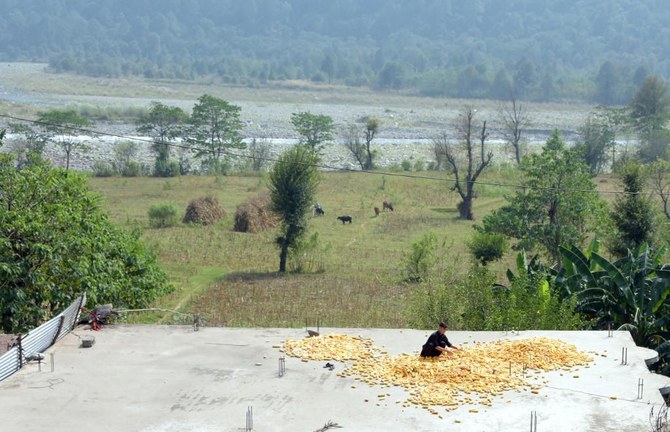
- The two foes regularly fire potshots over the Line of Control in the disputed Himalayan territory
- New Delhi insists the status of the territory is a purely internal matter
Israel-Hamas war protesters and police clash on Texas campus, Columbia University begins suspensions
Israel-Hamas war protesters and police clash on Texas campus, Columbia University begins suspensions
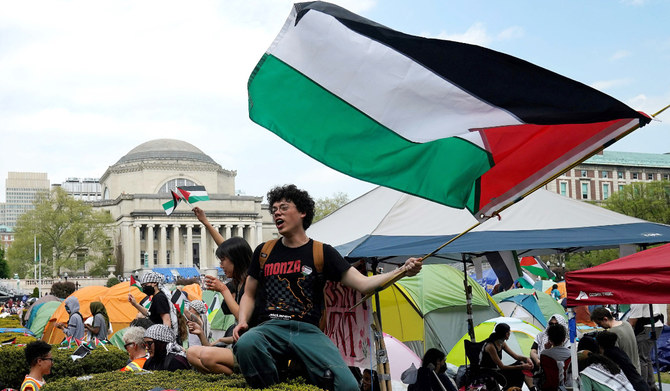
- At Columbia, student activists defied a 2 p.m. deadline to leave an encampment of around 120 tents on the school’s Manhattan campus
- Israel has killed more than 34,000 Palestinians in Gaza, mostly women and children, according to the health ministry in the Hamas-run territory
NEW YORK: Protesters and police clashed Monday at the University of Texas in a confrontation that resulted in dozens of arrests, and Columbia University began issuing suspensions as colleges around the US begged pro-Palestinian demonstrators to clear out tent encampments as commencement ceremonies approach.
From coast to coast, demonstrators are sparring over the Israel-Hamas war and its mounting death toll, and the number of arrests at campuses nationwide is approaching 1,000 as the final days of class wrap up. The outcry is forcing colleges to reckon with their financial ties to Israel, as well as their support for free speech.
The protests have even spread to Europe, with French police removing dozens of students from the Sorbonne university after pro-Palestinian protesters occupied the main courtyard. In Canada, student protest camps have popped up at the University of Ottawa, McGill University in Montreal and the University of British Columbia in Vancouver, The Canadian Press reported.
At the University of Texas at Austin, an attorney said at least 40 demonstrators had been arrested Monday, some of them by officers in riot gear who encircled about 100 sitting protesters, dragging or carrying them out one by one amid screams. Another group of demonstrators trapped police and a van full of arrestees between buildings, creating a mass of bodies pushing and shoving and prompting the officers to use pepper spray and flash-bang devices to clear the crowd.
The confrontation was an escalation on the 50,000-student campus in the state’s capital. On social media, Republican Gov. Greg Abbott reposted video of state troopers arriving, saying “No encampments will be allowed.” Just last week, hundreds of police pushed into protesters at the university, arresting more than 50 people.
The Texas protest and others grew out of Columbia’s early demonstrations that have continued. On Monday, student activists at Columbia defied a 2 p.m. deadline to leave an encampment of around 120 tents on the school’s Manhattan campus. Instead, hundreds of protesters marched around the quad, clapping, chanting and weaving around piles of temporary flooring and green carpeting meant for graduation ceremonies that are supposed to begin next week.
A handful of counter-demonstrators waved Israeli flags, and one held a sign reading, “Where are the anti-Hamas chants?”
The university didn’t call police to roust the demonstrators. But three hours after the deadline passed, school spokesperson Ben Chang said Columbia had begun suspending students. He didn’t indicate how many students were involved. He also didn’t say how the suspensions would be carried out or whether suspended students would be ejected from the campus.
Chang said that while the university appreciated the free speech rights of students, the encampment was a “noisy distraction” that was interfering with teaching and preparation for for final exams. The protests also made some Jewish students deeply uncomfortable, he said.
Protest organizers said they were not aware of any suspensions as of Monday evening.
The notice sent to protesters earlier Monday said if they left by the deadline and signed a form committing to abide by university policies through June 2025, they could finish the semester in good standing. If not, the letter said, they would be suspended, pending further investigation.
College classes are wrapping up for the semester, and campuses are preparing for graduation ceremonies, giving schools an extra incentive to clear encampments. The University of Southern California canceled its main graduation ceremony.
But students dug in their heels at other high-profile universities, with standoffs continuing at Harvard, the University of Pennsylvania, Yale and others.
Protesters at Yale set up a new camp with dozens of tents Sunday, nearly a week after police arrested nearly 50 and cleared a similar one nearby. They were notified by a Yale official that they could face discipline, including suspension, and possible arrest if they continued.
Yale said in a statement Monday that while it supports peaceful protests and freedom of speech, it does not tolerate policy violations such as the encampment. School officials said that the protest is near residential colleges where many students are studying for final exams, and that permission must be granted for groups to hold events and put up structures on campus.
In a rare case, Northwestern University said it reached an agreement with students and faculty who represent the majority of protesters on its campus near Chicago. It allows peaceful demonstrations through the June 1 end of spring classes, requires removal of all tents except one for aid, and restricts the demonstration area to allow only students, faculty and staff unless the university approves otherwise.
At Brown University in Rhode Island, school President Christina H. Paxton offered protest leaders the chance to meet with officials to discuss their arguments for divestment from Israel-linked companies in exchange for ending an encampment.
In the letter to student protesters at Columbia, school officials noted that exams are beginning and graduation is upcoming.
“We urge you to remove the encampment so that we do not deprive your fellow students, their families and friends of this momentous occasion,” the letter said.
The demonstrations have led Columbia to hold remote classes. The school said in an email to students that bringing back police “at this time” would be counterproductive. The university said it will offer an alternative venue for the protests after exams and graduation.
Columbia’s handling of the protests has prompted federal complaints.
A class-action lawsuit on behalf of Jewish students alleges a breach of contract by Columbia, claiming the university failed to maintain a safe learning environment, despite policies and promises. It also challenges the move away from in-person classes and seeks quick court action requiring Columbia to provide security for the students.
Meanwhile, a legal group representing pro-Palestinian students is urging the US Department of Education’s civil rights office to investigate Columbia’s compliance with the Civil Rights Act of 1964 for how they have been treated.
A university spokesperson declined to comment on the complaints.
The plight of students who have been arrested has become a central part of protests, with the students and a growing number of faculty demanding amnesty for protesters. At issue is whether the suspensions and legal records will follow students through their adult lives.
Demonstrators on other campuses, meanwhile, said they would stand firm. Jacob Ginn, a second-year University of North Carolina sociology graduate student, said he had been protesting at the encampment for four days, including negotiations with administrators Friday.
“We are prepared for everything and we will remain here until the university meets our demands and we will remain steadfast and strong in the face of any brutality and repression that they try to attack us with,” Ginn said in reference to a potential police sweep of the encampment.
US President holds separate calls with leaders from Qatar, Egypt over Gaza ceasefire talks

- The danger of a military escalation in Rafah was also stressed, in how it would add catastrophe to an already worsening humanitarian crisis that would impact stability and security in the region, the statement said
CAIRO: Egyptian President Abdel Fattah El-Sisi received a phone call on Monday from US President Joe Biden to discuss the latest developments in negotiations over a ceasefire in Gaza and the dangers of a military escalation in Rafah, a statement from Egypt’s presidency said.
The spokesman for the Egyptian Presidency said the call also touched on the exchange of Israeli hostages for Palestinian prisoners, a main sticking point in any comprehensive ceasefire deal between Hamas and Israel.
A Hamas delegation is currently in Cairo to deliberate on Israel’s response to a ceasefire deal.
The danger of a military escalation in Rafah was also stressed, in how it would add catastrophe to an already worsening humanitarian crisis that would impact stability and security in the region, the statement said.
“President El-Sisi stressed the necessity of full and adequate access to humanitarian aid, reviewing the intensive Egyptian efforts in this regard.
The two presidents also stressed the necessity of working to prevent the expansion of the conflict and reaffirmed the importance of the two-state solution as the means to achieve security, peace, and stability in the region,” the Egyptian presidency statement said.
Biden also held a phone call late on Monday with Qatar’s Emir Sheikh Tamim bin Hamad Al Thani, whose country has also played a role as mediator to the conflict.
“During the call, they discussed developments in the situation in the Gaza Strip and the occupied Palestinian territories, and efforts of the two countries to reach an immediate and permanent ceasefire agreement in Gaza,” Qatar’s Emiri Diwan said in a statement.
India protests separatist slogans allowed at Toronto event
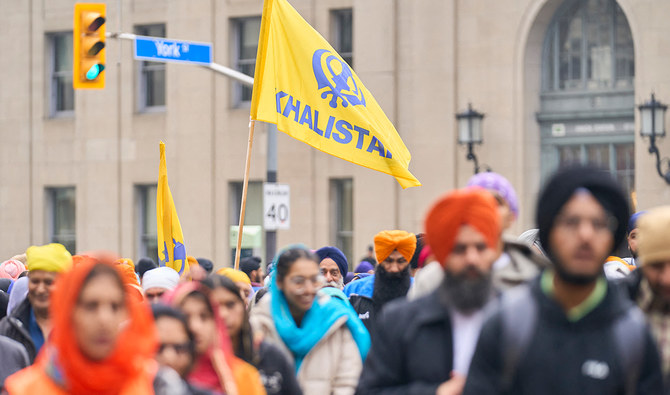
- Bilateral relations soured last year after Canada linked Indian agents to June 2023 murder of its national
- Hardeep Singh Nijjar, 45, was shot dead outside a Sikh temple in Surrey, which has a large Sikh population
NEW DELHI: India summoned the Canadian Deputy High Commissioner on Monday and expressed “deep concern and strong protest” after separatist slogans in support of a Sikh homeland were raised at an event addressed by Prime Minister Justin Trudeau.
Bilateral diplomatic relations soured last year after Trudeau said Canada was “actively pursuing credible allegations” that Indian agents were potentially linked to the June 2023 murder of a Canadian citizen.
Hardeep Singh Nijjar, 45, was shot dead outside a Sikh temple on June 18 in Surrey, a Vancouver suburb with a large Sikh population. Nijjar supported a Sikh homeland in the form of an independent Khalistani state and was designated by India as a “terrorist” in July 2020.
New Delhi has denied any formal government role in Nijjar’s murder.
India’s foreign affairs ministry said on Monday it had conveyed “deep concern and strong protest” at such actions “being allowed to continue unchecked at the event.”
Slogans supporting the rise of a separatist state were raised at an event in Toronto, according to ANI news agency, in which Reuters has a minority stake.
“We will always be there to protect your rights and your freedoms, and we will always defend your community against hatred and discrimination,” ANI reported Trudeau as saying.
Canada has the highest population of Sikhs outside their home state of Punjab in India, and the country has been the scene of many demonstrations that have irked India.
The Canadian foreign ministry did not immediately respond to a request for comment.
UN asks South Sudan to remove new taxes that led to a pause in food airdrops
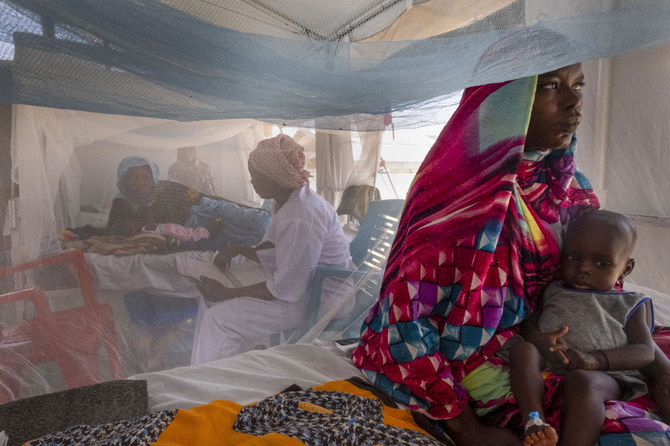
- UN said that pausing of airdrops in March had deprived of food 60,000 people who live in areas that are inaccessible by road
JUBA: The United Nations has urged South Sudan to remove newly imposed taxes and charges that led to the suspension of UN food airdrops for thousands of people who depend on outside aid.
The UN Humanitarian Affairs Agency said Monday in a statement that the pausing of airdrops in March had deprived of food 60,000 people who live in areas that are inaccessible by road, and their number is expected to rise to 135,000 by the end of May.
The UN said the new charges would have increased operational costs to $339,000 monthly, which it says is enough to feed over 16,300 people. The new charges introduced in February are related to electronic cargo tracking, security escort fees and new taxes on fuel.
“Our limited funds are spent on saving lives and not bureaucratic impediments,” Anita Kiki Gbeho, the UN humanitarian coordinator for South Sudan, said.
UN spokesman Stéphane Dujarric said in New York that the taxes and charges are also impacting the nearly 20,000-strong UN peacekeeping mission in South Sudan, “which is reviewing all of its activities, including patrols, the construction of police stations, schools and health care centers, as well as educational support.”
The UN says the South Sudan government had said it would remove the new charges and taxes but had not committed to it in writing since February.
An estimated 9 million people out of 12.5 million people in South Sudan need protection and humanitarian assistance, according to the UN The country has also seen an increase in the number of people fleeing the war in neighboring Sudan, further complicating humanitarian assistance to those affected by the internal conflict.
French police remove pro-Palestinian students from the courtyard of Sorbonne university in Paris
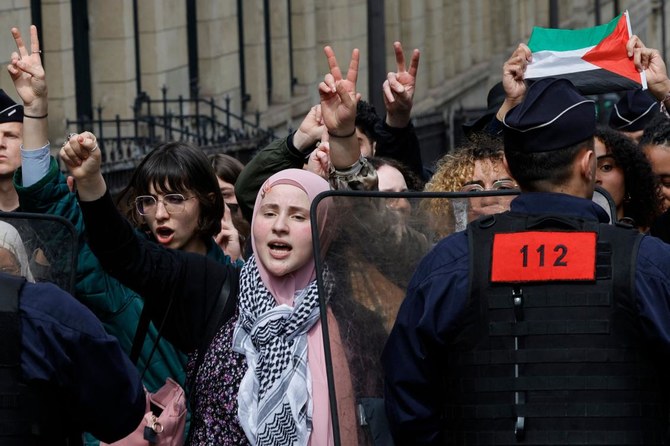
- About 50 protesters set up tents at midday Monday at the elite university’s courtyard
PARIS: French police removed dozens of students from the Sorbonne university after pro-Palestinian protesters occupied the main courtyard of the elite institution in Paris on Monday.
About 50 protesters set up tents at midday Monday at the Sorbonne university courtyard in support of Palestinians, echoing similar encampments and solidarity demonstrations across the United States.
Protesters unveiled a giant Palestinian flag and chanted slogans in support of Palestinians in Gaza, as Israel continues its offensive following the deadly Oct. 7 Hamas attack that triggered the Israeli-Hamas war. Police entered the university grounds in the early afternoon and removed them.
About 100 demonstrators took part in the protest near the prestigious university amid heavy police presence that were also guarding the university entrance to prevent students from setting up camp inside again.
Lorelia Frejo, a graduate student at the Sorbonne who joined a protest outside the university, said police used force to remove her peers from the courtyard. “They were peaceful and police took them out with no explanation,” Frejo said. Students in Paris were inspired by the protests at New York’s Columbia University who remain steadfast despite police pressure, she added.
“They (Columbia protesters) are very strong and want to fight for justice and for peace in Palestine,” Frejo said.
The Sorbonne occupies a unique place at the heart of French public and intellectual life. Last week, President Emmanuel Macron chose it as the venue to deliver a speech on his vision of Europe ahead of elections for the European Parliament in June.
Last week protests broke out at another elite university in the French capital region, the Paris Institute of Political Studies, known as Sciences Po, which counts Macron and Prime Minister Gabriel Attal among its many famous alumni.
Tensions had broken out on campus as pro-Palestinian students inspired by Gaza solidarity encampments at campuses in the United States sought to occupy an amphitheater.
On Friday, pro-Palestinian and pro-Israeli demonstrators faced each other in a tense standoff in the street outside the school. Riot police stepped in to separate the opposing groups.
The protest ended peacefully, when students agreed to evacuate the building late on Friday. The head of Sciences Po said an agreement with students had been reached.



